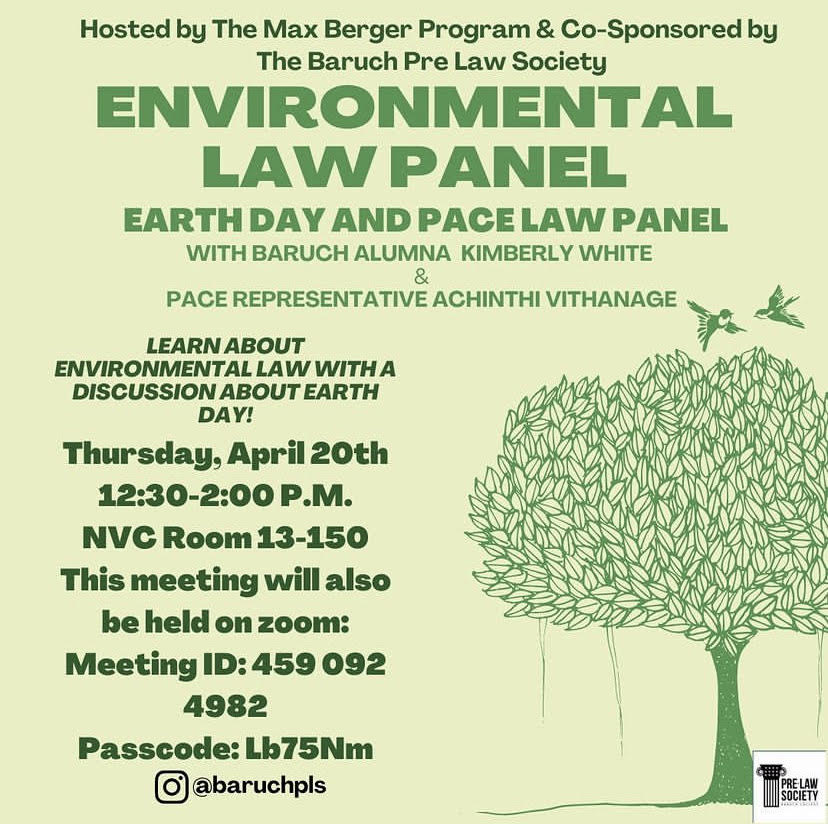Pre-Law Society panel discusses environmental law for Earth Day
May 1, 2023
Baruch College’s Pre-Law Society hosted an environmental law panel on April 20, where Baruch alumna Kimberly White and Achinthi Vithanage, associate director of Environmental Law Programs at Pace University, shared their own experiences and offered students valuable tips on how to progress in the field of law.
At the panel, White discussed her upbringing where she learned a lot about food justice issues. She also learned about growing food in a small area, environmental racism and the connections between imperialism and the environment.
Once enrolled at Baruch, she knew she wanted to spend her time working toward learning about how the environment is connected to other systems of power.
During college, White was convinced she wanted to be an environmental lawyer. She worked as an office assistant at Earth Justice for a couple of years to gain experience in law practice.
“I just wanted a foot in the door,” White said.
During her time as an office assistant, White was exposed to a plethora of resources, some being environmental lawyers who mentored and supported her.
“I highly recommend trying to get a foot in the door in any place you’re interested in to really see what it’s like to do environmental legal work if you’re interested,” White said.
She later decided to focus on academia and became a law professor. White is now enrolled in the University of Pennsylvania’s history program, where she studies West Indian migrants in the 20th century and their relationship to their undocumented status.
White mentioned that environmentalism is still an integral part of her life and is very much attributable to her daily practices, ethics and lifestyle.
As an academic, she recommends “publishing legal scholarship on environmentalism and thinking of that as a useful tool for communicating within the legal academy.”
Research can be very useful to advance environmental efforts, White noted.
“In terms of the relationship between climate change, imperialism, and immigration, there needs to be more discussion around environmental forces that are pushing people to move,” White said.
“Where will people have to go? Who will accommodate them?” White added. “And efforts to compel wealthier nations such as the U.S. to give money to countries that are going to be disproportionately affected by the effects of climate change but are not as responsible for them.”
White suggests writing a letter to oneself before making the decision to go to law school. A letter of self-reflection will help one remember their values and remind them of their passion for a certain field, she said.
“Think through what you care about, what you value, and what you’re there for.”
Achinthi Vithanage is from Sydney, Australia, where she grew up and completed her law degree.
In addition to being an associate director, she is also an adjunct law professor for international environmental law at Pace Law School. Pace University’s Environmental Law Program ranked number one in the country for two consecutive years as of now.
Vithanage mentioned how the first Earth Day was in 1970 and started because there were many disasters that were happening in the U.S at the time. There was a river that caught on fire and several spills in the ocean, which all spurred a call to action and a growing desire to put laws in place. Lawyers and lawmakers are a crucial part of keeping the environment in check.
Vithanage talked about how there are various ways to be involved in environmentalism that don’t involve litigation. She suggested that Baruch students be activists and work for public interest and community organizations, as well as state and local environmental agencies.
An individual doesn’t have to necessarily be involved in government to make an impact, as there are other ways to practice environmentalism, Vithanage emphasized.
For White, she had found internship opportunities at Baruch by reaching out to organizations and following up with people whom she met at activist events.
She was also involved in an environmental research program with a professor at Queens College and was exposed to it through one of Baruch’s most valued resources: the Starr Career and Development Center.
Practicing environmental law is just one of the many ways an individual can make a difference on Earth’s environment.







